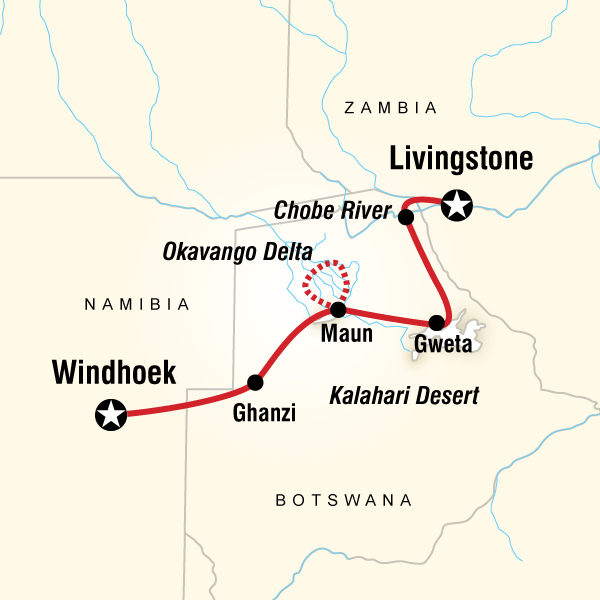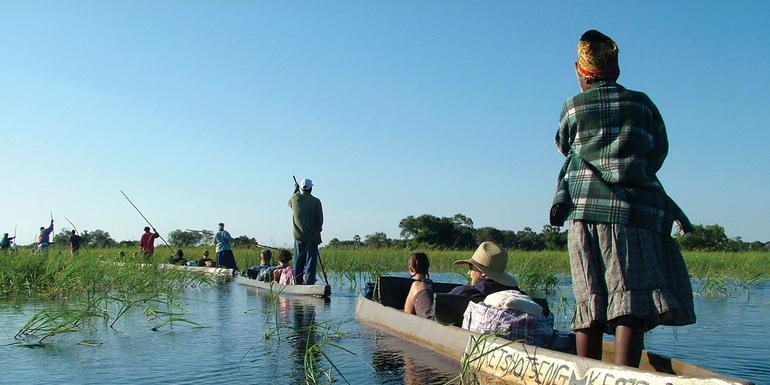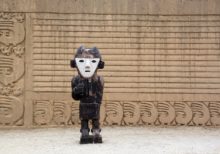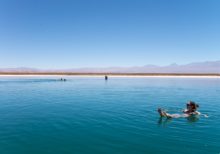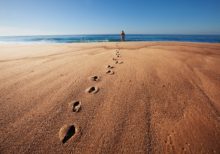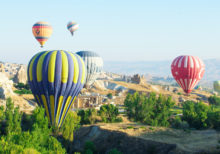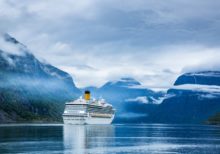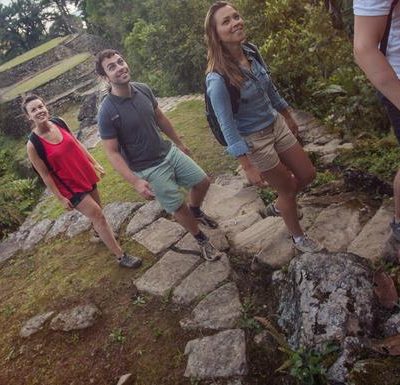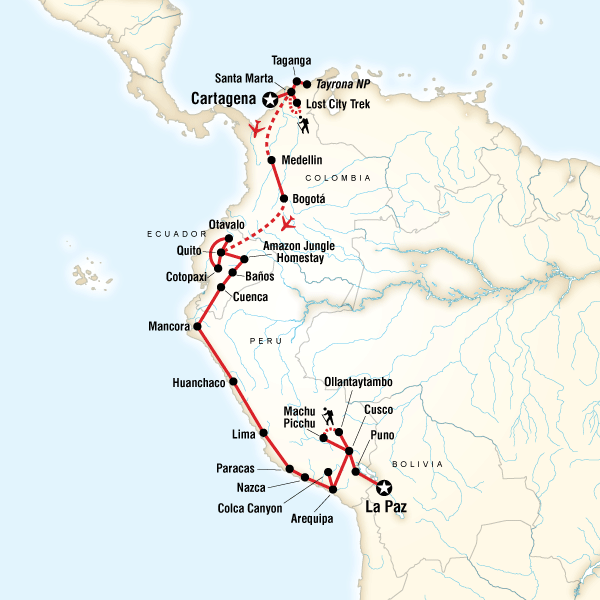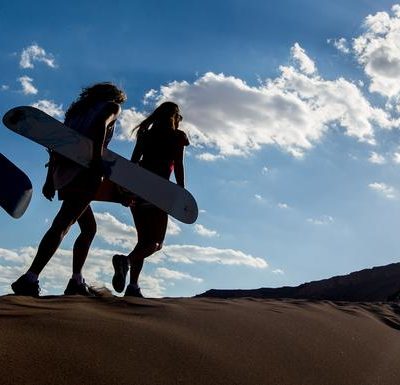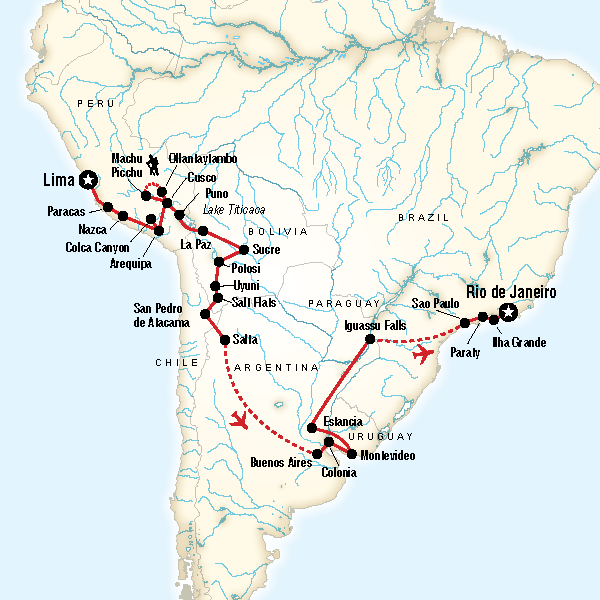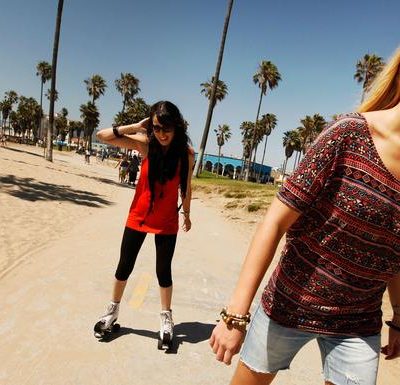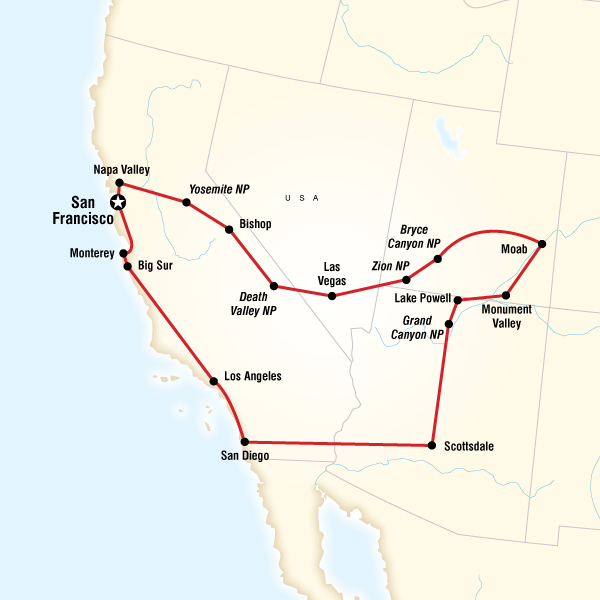More Information
What’s Included
Okavango Delta overnight bush camping excursion. All transport between destinations and to/from included activities.
Highlights
Meet the San Bushmen on the fringes of the Kalahari Desert, get into the wild with dug-out canoe rides and bush camping in the Okavango Delta, cruise the Chobe River at sunset, feel the mist of the mighty Victoria Falls.
Dossier Disclaimer
The information in this trip details document has been compiled with care and is provided in good faith. However it is subject to change, and does not form part of the contract between the client and the operator. The itinerary featured is correct at time of printing. It may differ slightly to the one in the brochure. Occasionally our itineraries change as we make improvements that stem from past travellers, comments and our own research. Sometimes it can be a small change like adding an extra meal along the itinerary. Sometimes the change may result in us altering the tour for the coming year. Ultimately, our goal is to provide you with the most rewarding experience. Please note that our brochure is usually released in November each year. If you have booked from the previous brochure you may find there have been some changes to the itinerary.
VERY IMPORTANT: Please ensure that you print a final copy of your Trip Details to review a couple of days prior to travel, in case there have been changes that affect your plans.
Itinerary Disclaimer
While it is our intention to adhere to the route described below, there is a certain amount of flexibility built into the itinerary and on occasion it may be necessary, or desirable to make alterations. The itinerary is brief, as we never know exactly where our journey will take us. Due to our style of travel and the regions we visit, travel can be unpredictable. The Trip Details document is a general guide to the tour and region and any mention of specific destinations or wildlife is by no means a guarantee that they will be visited or encountered. Aboard expedition trips visits to research stations depend on final permission.
Additionally, any travel times listed are approximations only and subject to vary due to local circumstances.
Important Notes
1. Please note that this tour combines with other G Adventures tours. As such, the staff and some travel companions on your tour may have previously been traveling together with G Adventures, prior to Day 1 of your tour. Likewise, some staff and travel companions may be continuing together on another G Adventures tour, after your trip concludes
2. This is not a physically demanding journey; however, travelling can be difficult, with long drives and poor road conditions at times. Despite this, most clients feel that the diversity of the African landscape, countries, culture and wildlife are all well worth the experience. We use a comfortable and safe customized safari truck for the long drives.
3. As of January 26th 2011 the Director General of the Zanzibar Commission for Tourism declared a valid Yellow Fever Certificate is required at all points of entry into Zanzibar. This includes the airport, seaport and other points of entry. Failure to provide the correct certification may result in an on the spot vaccination or $50 fine. Please check with your health expert for advice on Yellow Fever and other inoculations required for this area.
4. It is compulsory to show a valid Yellow Fever Certificate if you are travelling to Botswana from a Yellow Fever endemic country. Entry into Botswana when travelling from the following countries (but not limited to) will require a Yellow Fever Certificate: Angola, Benin, Burkina Faso, Burundi, Cameroon, Central African Republic, Chad, Congo, Democratic Republic of the Congo, Republic of the Cote d’Ivoire (Ivory Coast) Equatorial Guinea, Ethiopia, Gabon, Gambia, Ghana, Guinea Zambia, Guinea-Bissau, Kenya, Liberia, Mali, Mauritania, Niger, Nigeria, Rwanda, São Tomé and Príncipe, Senegal, Sierra Leone, Somalia, Sudan, Tanzania, Togo, Uganda, Argentina, Bolivia, Brazil, Colombia, Ecuador, French Guiana, Guyana, Panama, Paraguay, Peru, Suriname, Trinidad and Tobago, Venezuela
5. An essential part of your safari is participation. The group is usually divided into small groups and given different tasks which change on a day to day basis, from kitchen duty group (helping in prepare meals and clean up afterwards), the packing group (sets up all tables and chairs outside) and the cleaning group (which cleans the truck by emptying the rubbish bin and brooming). it is all part of your adventure and when everyone puts in a little effort the trip will run smoothly. Your CEOs will do all the meal preparation, but we do ask the clients to help with the washing up. Team spirit is part of the fun! All camping equipment (with the exception of your sleeping bag and pillow) is supplied. We supply dome tents and assembly/disassembly takes only 5 minutes. All tents have built-in insect nets. Mattresses are also available, which are approximately 4cm thick, warm and comfortable.
6. Sleeping bags can not be rented on any of our Africa overland or safari
7. Your CEO aims to provide you with the best service possible during your tour. They will be joining you in the back of the truck for a maximum of approximately 50% during driving, to answer questions and provide more information about the areas that you visit. They will spend the remainder of the driving time in front with the driver to enable them to make bookings, do planning and to fulfil other organizational requirements of the tour. During game drives, your CEO will ensure to accompany you in the passenger area of the truck. This is of course because they have a lot of knowledge to share with you during these exciting game drives. Please do not hesitate to ask your CEO any questions.
8. Please note that on all our Overland adventure vehicle (OAV) safaris there is a maximum of 22 people per vehicle.
9. VISAS. Please read the Visa section very carefully. Visas are your own responsibility. Always double check with the embassies what each countries requirement are.
10. Depending on the lunar cycle, Ramadan will fall between June 18th and July 17th, 2015. Please note that Ramadan is a month of fasting observed by Muslims throughout the world, during which time the followers of Islam should not eat or drink between sunrise and sunset. In Zanzibar and other Muslim areas in Africa, it is important to note that there may be some limitations to services and disruptions to schedules during Ramadan. Generally our tours still operate effectively during this period and food is available to non-muslims throughout the day. It is important to display increased cultural sensitivity during Ramadan, particularly in Zanizbar. Please wear loose fitting clothes, that cover knees and shoulders, and try to avoid eating, drinking or smoking in public out of respect for those who can’t at that time.
Group Leader Description
On this tour, you will be accompanied by two Chief Experience Officers (CEOs). The Chief Experience Officers (CEOs) will be the group manager and leader, cook and driver. They will provide information on the places where we are travelling, offer suggestions for things to do and see and introduce you to our local friends. He/she will take care of the small things so you can concentrate on enjoying your adventure.
All of our CEOs in southern Africa are experienced group leaders, with a broad knowledge base of the region’s history, cultures, and wildlife. Most of our leaders in the region are from South Africa, though it may be possible that you’ll have a leader from another country in the southern African region.
All of our overland adventure vehicle (OAV) drivers are experienced in the routes travelled, and highly skilled in dealing with different terrains. All of our cooks will organize and lead the meal preparation, and have experience in cooking a variety of local and international dishes for large groups.
We also use local guides for some included activities where we think more specific knowledge will add to the enjoyment of the places we are visiting.
Group Size Notes
Max 22, Avg 18
Meals
As mentioned above, most of the meals on this tour are included in the tour price. When a meal is not included, this is because there are often many options available – we would like to give you the opportunity to explore a bit and test the local cuisine yourself. In these cases, your CEO will be able to suggest some good local restaurants or options for you to choose from.
All included meals will be prepared from fresh local produce. The majority of the shopping for foodstuffs will be done before the trip departs, and fresh goods, such as meats, fruits, vegetables, and dairy products, will be bought en route during the trip from supermarkets, local shops and markets. Breakfasts will generally consist of breads and cereals, if time allows a warm breakfast may be prepared. Many lunches will be provided en-route and will be light meals such as sandwiches and/or salads. All evening meals will be freshly-prepared hot meals, and will consist of a variety of continental and local dishes.
Our cook will organize the meal preparation and lead the way here, but will prepare a duty schedule for ensuring a fair, rotating participation from you and your group members in the meal preparation and dish washing duties.
Vegetarian meals and other dietary requirements need to be specified prior to arrival.
Transport
Overland adventure vehicle (OAV), mokoro, walking.
About our Transportation
We use a large 24 seat overland adventure vehicle (OAV) to criss-cross through southern Africa. The overland adventure vehicle (OAV) allows the entire group to travel together, and because of its height, is great for game viewing and for enjoying the scenic landscape.
Road conditions can run the full gamut from new to being in very poor condition. This style of travel is by no means luxury as we are traveling in a truck, but it does allow us the flexibility of making stops when needed, and reaching some out-of-the way parts of Africa where the traditional safari crowd would not dare to go.
Here’s a quick look at the well-equipped G Adventures overland adventure vehicle (OAV):
– Storage for main luggage in a compartment under the seating area (accessed from the outside of the truck). Day packs can be stored at your feet (there is plenty of room).
– Onboard safety box(es) for valuables.
– Front view windows
– Large sliding windows, great for game viewing
– Fully equipped retractable kitchen
– Intercom between seating area and driver
– Inverter for battery charging (South African plug – 220-240V)
Please note that our trucks do not have on-board bathrooms. Nor do they have seats that recline as often reclining seats will break, and thus you will have some seats that recline and some that don’t.
This is not a physically demanding journey; however, travelling can be difficult, with long drives and poor road conditions at times. Please take note of the travel times and distances in the above itinerary, and consider that this is often on poor quality, bumpy roads. Despite this, most clients feel that the diversity of the African landscape, culture and wildlife are all well worth the experience.
Solo Travellers
We believe single travellers should not have to pay more to travel so our group trips are designed for shared accommodation and do not involve a single supplement. Single travellers joining group trips are paired in twin or multi-share accommodation with someone of the same sex for the duration of the trip. Some of our Independent trips are designed differently and single travellers on these itineraries must pay the single trip price.
Accommodation
Participation camping (7 nts), basic bush camping (1 nt).
My Own Room
About Accommodation
Camping in Africa is truly an adventure. You will be able to get off the beaten track to get a first-hand experience of the beautiful wilderness and nature. While camping, we stay at designated campsites in national parks and outside towns. Campsite facilities in southern Africa are generally good, but can be basic in certain places. There are generally small restaurants and/or bars, washing facilities and occasionally telephones available.
The camps have flush toilets, and showers at some camps are outdoors, having simple reed enclosures for privacy. Additionally, warm water is available at most sites, but it is not guaranteed to always be warm when you take your shower; the warm water may be used up others who also use the camp. We usually set-up camp within close proximity to the toilet facilities, though occasionally to reach them you may to walk a short distance.
All camping equipment (with the exception of your sleeping bag and pillow) is supplied, including camp mattresses, which are warm and comfortable. We supply dome tents and assembly/disassembly takes only 5 minutes. They are good quality, durable, industry-standard 2-person safari canvas tents. Please note that most adults will not be able to fully stand up inside the tents, though most travellers find these more than adequate, as they have a base area of approximately 4 square meters. These tents are regularly treated with a waterproofing agent, but under certain rainy conditions, the tent fabric may become saturated to the point where seepage or leakage may occur. All tents have built-in mesh insect netting on the windows and doors.
We travel with our own portable camp chairs with a comfortable back-rest, and we utilize our own cooking equipment to provide the group good quality camp meals.
In camping within the national parks and conservation areas, some camp sites are enclosed for keeping the resident wildlife out. Other camps are open to the natural environment – care must be taken, especially at night, when a torch/flashlight is recommended when walking around the camp area.
Your camping experience in the Okavango Delta is fondly called “bush camping”. This will be the most basic two nights of our trip, as there is no running water, no showers, nor toilets facilities. You will be truly camping in the wild, away from civilization and its comforts, and completely surrounded by nature – an unbelievable experience some in fact feel is the highlight of the trip.
Despite the challenge that a few days “roughing it” may pose to some, the experience of being that close to nature, camping under the African stars, and seeing incredible wildlife at your tent door-step is not just gratifying but ultimately an experience of a lifetime.
Joining Hotel
Hotel Safari
Corner of Auas and Aviation Roads
Windhoek, Namibia
+264-61-2968-000
Joining Instructions
Upon arrival in Windhoek, arrival transfers are not included. Please make your way to the joining hotel. Windhoek Hosea Kutako International Airport is about 40 km from downtown. There are a variety of ways to get into the city.
Taxi: When arriving at the international terminal, walk straight ahead and out the doors and just to your left you will see sedan vehicles which are the taxis. The amount should be $250N but agree the price before getting into the vehicle.
Shuttle: When arriving at the international terminal, walk straight ahead and out the doors and just to your left you will see a mini-van. This is the shuttle service to Windhoek/Windhoek hotels/guesthouses and departs when the vehicle is reasonably full (Cost is $120N payble in South African Rand 1ZAR=$1N).
Pre-arranged transfer: Upon walking out of the international arrivals, look for a transfer person on with a G Adventures sign and your name. Ask him/her what hotel he/she will take you to (do not volunteer this information). Then present your passport for proof of identity.
A brief departure meeting will be held in the hotel reception area in evening on Day 1 of your tour. Upon arrival look for information from your CEO regarding meeting time and also the rest of the tour.
The tour ends in Livingstone on Day 10 after breakfast.
Arrival Complications
We don’t expect any problems, and nor should you, but if for any reason you are unable to commence your trip as scheduled, as soon as possible please contact your starting point hotel, requesting that you speak to or leave a message for your CEO (if you are not on a group tour please refer to the emergency contact details provided in this dossier). If you are unable to get in touch with your leader, please refer to our emergency contact details. If you have pre-booked an airport transfer and have not made contact with our representative within 30 minutes of clearing customs and immigration, we recommend that you make your own way to the Starting Point hotel, following the Joining Instructions. Please apply to your travel agent on your return for a refund of the transfer cost if this occurs.
Emergency Contact
Should you need to contact us during a situation of dire need, it is best to first call either the G Adventures Local Reprsentative (if one is listed below) or our G Adventures Local Office. If for any reason you do not receive an immediate answer, please leave a detailed message and contact information, so they may return your call and assist you as soon as possible.
AIRPORT TRANSFER
If you have purchased an arrival through G Adventures or if an arrival transfer is included in the cost of your tour, please note that:
Your arrival transfer has been arranged based on flight information provided to us. If you are advised of a flight schedule change within 48 hours of your scheduled arrival time, we will do our best to rearrange your arrival transfer however we cannot guarantee this. If your arrival transfer does not arrive within 30 minutes after you have exited the arrivals area please take a taxi to your start point hotel.
EMERGENCY CONTACT NUMBERS
G Adventures Local Representative (South Africa)
After Hours Emergency number
From outside South Africa: +27 82 556 4562
From within South Africa: 082 556 4562
If you are unable for any reason to contact our local office, please call the numbers listed below, which will connect you directly with our 24 hour Sales team, who will happily assist you.
Toll-free, North America only: 1 888 800 4100
Calls from UK: 0844 272 0000
Calls from Germany: 01805 70 90 30 00
Calls from Australia: 1 300 796 618
Calls from New Zealand: 0800 333 307
Outside North America, Australia, New Zealand, Germany and the UK: +1 416 260 0999
What to Take
You will be on the move a lot, so our advice is to pack as lightly as possible. Your baggage should be clearly labeled and restricted to one soft compact suitcase, or sports bag, maximum 15kg, plus a daypack. Luggage limits on airlines are strictly enforced and space on vehicles is limited. Porters are not available, so be prepared to carry your own bags.
For our camping style tours you will need to provide your own sleeping bag, small pillow and sleeping sheet (if you would like). We provide the tent and the sleeping pads.
Please note that the seasons in Africa is quite extreme. Winters (especially South Africa, Namibia and Botswana) can be really cold and summers will be really hot.
If you travel during winter months(May to October) please ensure that you bring warm clothing and a suitable sleeping bag.
A set of smart casual clothes is also advisable.
Checklist
•Fleece top
•Windproof/waterproof jacket
•Small towel and swimwear
•4 shirts/t-shirts
•Sun hat
•Warm sleeping bag
•1 pair of shorts
•2 pairs of long trousers
•1 pair hiking pants/track pants
•Hiking boots/sturdy walking shoes
•Sport sandals
•Sunblock
•Sunglasses
•Toiletries (biodegradable)
•Watch or alarm clock
•Water bottle
•Pocketknife
•Flashlight (with extra batteries and bulbs), a head torch is very useful!
•Money belt
•First-aid kit (should contain lip salve, Aspirin, bandaids, anti-histamine, Imodium or similar tablets for mild cases of diarrhea, rehydration powder, insect repellent, extra prescription drugs you may be taking)
-Day pack
-Camera with extra memory cards and batteries
-Personal Entertainment
-Binoculars
-Waterproof backpack cover
Documents:
•Passport (with photocopies)
•Travel insurance (with photocopies)
•Yellow Fever Certificate (with photocopies)(if traveling from an endemic country).
•Airline tickets (with photocopies)
•Credit or debit card (see personal spending money)
•G Adventures vouchers, pre-departure information and dossier
•Any entry visas or vaccination certificates required
Laundry
Laundry is a bit difficult to get it done on this route. The only possibly option is to leave your laundry in Maun at our accommodation, they offer laundry service, as soon as you come back out of the Delta you will have your laundry back.At some of the camp sites further on the route washing can be done by hand by some of the local women, and the price can be negotiated. The cost is usually bewteen ZAr30-ZAr50 per load. It is recommended to bring some washing powder or liquid with you for smaller items.
Visas
All countries require a valid passport (with minimum 6 months validity). Contact your local embassy, or consulate for the most up-to-date visa requirements, or see your travel agent. It is your own responsibility to have the correct travel documentation. Visa requirements for your trip will vary depending on where you are from and where you are going. We keep the following information up to date as far as possible, but rules do change and sometimes without warning. While we provide the following information in good faith, it is vital that you check yourself and understand that you are fully responsible for your own visa requirements
Namibia
Nationals from the from the following countries entering Namibia as bone fide tourists
are exempted from visa requirements: Angola, Australia, Austria, Belgium, Botswana, Brazil, Canada, Cuba, Finland, France, Germany, Italy, Japan, Kenya, Lesotho, Liechtenstein, Luxembourg, Malawi, Malaysia, Mozambique, Netherlands, New Zealand, Norway, Republic of Ireland, Russia, Spain, (South Africa *), Swaziland, Switzerland, The Scandinavian countries, Tanzania, UK, USA, Zambia, Zimbabwe
One should first however, check if there is a Namibian Consulate in your country of residence. This will make the process of applying for a visa a lot simpler:
Botswana
Whilst African Travel Gateway does not arrange visas, the following information has been provided to assist you in finding out the visa requirements for the passport that you are holding. While every effort is made to keep this information updated, it is subject to change.
All nationals of foreign countries, except those from countries which have reached visa abolition agreements with Botswana, require a visa for entering Botswana.
Nationals not requiring visas:
Members of all Commonwealth countries (except the nationals of Ghana, Nigeria, Sri Lanka, Pakistan and Bangladesh), Austria, Belgium, Denmark, Finland, France, German Federal Republic, Greece, Iceland, Italy, Lichtenstein, Luxembourg, Namibia, Netherlands, Norway, Republic of Ireland, Samoa (Western), San Marino, Sweden, Switzerland, Uruguay, USA and Yugoslavia.
Any visitor – whether visa exempted or not that wishes to stay more than 90 days should apply for prior permission for the extended period to the Chief Immigration Office in Gabarone. No visitor is allowed to work or seek employment in Botswana
One should first however, check if there is a Namibian Consulate in your country of residence. This will make the process of applying for a visa a lot simpler
Zambia
***Please be sure to visit http://www.zambiaimmigration.gov.zm to determine if your nationality requires a Visa, can purchase one upon arrival or must apply for one in advance.
Note that Zambia and Zimbabwe have come out with a UNIVISA. This Visa allows holders to cross back and forth between Zambia and Zimbabwe as many times as they would like within a 30-day period (giving the passenger the ability to see Victoria Falls from both sides). These Visa’s can be purchased at Livingstone and Lusaka airports and the border posts at Victoria Falls and Kazangula for 50USD.
We would recommend this Visa to our passengers as a single entry Visa to Zambia costs 50USD and upwards (therefore, the UNIVISA offers more value). If they should decide they wish to visit the Zimbabwe side of Victoria Falls, they could do so at no additional cost and without obtaining another Visa.
Information below is in regards to Zambian Visas only.
Entry / exit requirements:
A passport valid for three months beyond the date of entry, visa and evidence of yellow fever vaccination are required. Visas are available Zambia Embassies (see list below). Travellers should obtain the latest information and details from the Embassy of the Republic of Zambia.
An entry visa is required. Visas can be obtained by most nationalities at the point of entry.
Approximate costs include:
– U.S.A (US$20),
– Canada (US$60 on arrival; CAD$75 for advance application)
– U.K. (US$20; US$45 for advance application)
– Australia (US$20 on arrival)
– Austria, Belgium, Holland, Ireland, Israel, Portugal & Spain (varies from US$10-100)
– South African (USD15 on arrival)
Visa costs can change at any time and with little notice depending on the political climate of the region.
Detailed Trip Notes
American Dollars that are series 1996 or earlier are not accepted and very difficult to change in Southern and Eastern Africa, as there are a lot of forgeries.
REGIONAL INFORMATION
Climate
Southern Africa is renowned for its excellent outdoor living climate. The winter months are from May to September and are characterized by cold nights and pleasant days. Summer is from October to April and starts off with increasing dry heat and dust. Rains generally only start from mid to late December and last until March; this period is hot and humid. Large parts of Namibia are desert environment, so you will have to come prepared with a three-season sleeping bag and appropriate clothing for the winter season (nights only).
Local Currency
Namibian Dollar; Botswana Pula; Zambian Kwacha. We recommend that you bring US$ or South African Rand for personal expenses on this trip. Traveller’s cheques can be changed in Maun and Livingstone.
Electricity
220-240V, 50 HZ, Most electrical plugs are 15 amp 3-prong with round pins. International adaptor are called for, they can be purchased locally (approx 2 U$).
Language
There are multiple official languages in Namibia, Botswana and Zambia, although English is widely spoken. There are also numerous dialects spoken throughout different parts of these lands.
NAMIBIA
Full country name: Republic of Namibia
Area: 824,292 sq km (318,259 sq mi)
Population: 2,032,000 (July 2005 est) 1.820,916 (Census 2002)
Capital city: Windhoek (pop 161,000)
People: 86% African (50% Owambo, 9% Kavango, 7% Herero, 7% Damara, 5% Nama, 4% Caprivian, 3% San, 2% Baster, 0.5% Tswana), 7.4% mixed, 6.6% white Languages: English, Afrikaans, German, Oshivambo, Herero, Nama
Religion: Christian, Lutheran, native religions
Government: Republic
President: Sam Nujoma
Major industries: Meat packing, fish processing, dairy products, mining (diamond, lead, zinc, tin, silver, tungsten, uranium, copper), millet, sorghum, peanuts, livestock, fish, tourism.
Major trading partners: UK, South Africa, Spain, Japan, Germany, USA
Formally known as South West Africa. The whole territory became German protectorate in 1884, except for the British/Cape Colony enclave of Walvis Bay. After the First World War the territory was administered by South Africa until independence on 21 March 1990. The capital is Windhoek and the second largest town is Walvis Bay, Namibia’s only port. Swakopmund is a coastal town with a German influence and revolves mainly around tourism. Namibia’s economy relies on diamond mining in the south, cattle farming in the north, fishing along the coast and tourism. Most of the country is desert or semi desert. There is a population of around 1.8 million. This, around 1, 5 people per sq. km is one of the lowest in the world. The official language is English although there are many different cultures including Herero, San, Koikoi, Owambo, Afrikaans and German. Namibia was at one stage a German colony therefore having German-speaking people. About 75% of the locals are Christian and the others have traditional beliefs. Namibia is a land of contrasts. Being largely semi-desert and desert, midsummer temperatures may rise to 40°C, while winter night temperatures can drop to freezing. Along the coast it is cool, with regular morning fogs. Namibia’s rain falls in summer, from October to April, and the land averages 300 days of sunshine annually.
BOTSWANA
Full country name: Republic of Botswana
Area: 600,370 sq km (231,800 sq mi)
Population: 1.6 million Capital city: Gaborone (pop 192,000)
People: Botswana 60%, Bakalanga, Basarwa, Bakgalagadi
Languages: English, Setswana
Religions: indigenous beliefs 50%, Christian 50%
Government: parliamentary republic
President: Festus Mogae
Major industries: diamonds, copper, nickel, coal, salt, soda ash, potash, livestock processing, sorghum, maize, millet, pulses, groundnuts (peanuts), beans, cowpeas, sunflower seed, livestock
Major trading partners: EU, Southern African Customs Union (SACU), Zimbabwe
The first inhabitants of Botswana were the San (Bushmen). They still populate the country, but the Tswana tribe is now more prominent. Other tribes include the Kalanga, Nbukushy, Yei and the Herero. The Herero women still wear the full-length Victorian-style dresses, which were introduced to them by German missionaries in the late 1800’s, however it is now a tribal trademark. The British controlled Bechuanaland (as Botswana was then known) from 1885 until the country received their independence on September 30th 1966. Ironically diamonds were discovered in Botswana in 1967! Interesting fact – Botswana’s diamonds do very well on the International market as they are classified as “Blood free,” meaning they are not used to fund guerrilla warfare. Botswana has the strongest economy and currency in Africa, mostly due to their diamonds and livestock. The European Union put many stipulations on their imported meats and Botswana’s tight vetenary checks, aiming at controlling foot and mouth, mean that the EU are happy to buy their meat. Agricultural income will improve when they have combated the problem of widespread drought. They are currently installing irrigation systems around the country to try to feed the most water-deprived areas. Botswana handles it’s international debt much better than any other African country with the interest being paid with one months export earnings, rather than the six months earnings it takes most other African countries. With the amount of for ex the have saved up the country could survive with no income for 36 months. Botswana has the world’s highest birth rate at 3.5%, and average women have 5 children. The country has a strong currency, the Pula meaning rain and the Thebe meaning raindrop. Government policies and poaching: Their policy on tourism is “high cost and low impact” therefore rather having a few less tourists and charging more money for the privilege of a visit to a park or similar. The country has a very good army, which has an anti poaching unit. Poaching has in the past been a problem in the country but in now almost under control. The army is allowed to shoot to kill without asking questions if you are caught poaching. Rhinos are very few due to poaching and they have breeding programs in place.
ZAMBIA
Full country name: Zambia
Area: 752,615km2 (17th largest in Africa)
Population: 10.4 million
Capital city: Lusaka
Largest Towns: Lusaka, Ndola, Livingstone, Kabwe, Kitwe.
People: Bemba, Tonga, Nyanja, Ngoni, Lozi plus many other different groups as well as Colonial ex-pats and people of Asian descent
Official Language: English
Other Languages: Bemba, Tonga, Nyanja, Lozi
Religion: Christian, ZCC and Islam
Government: Multiparty parliamentary democracy
President: Levy Mwanawasa
Currency: Kwacha
Major industries: Agriculture (mainly subsistence farming), mining, tourism
• Formally called Northern Rhodesia, Zambia gained its independence from colonial Great Britain in 1964.
• By the end of 1970, Zambia has become one of the poorest countries in the world due to corruption, mismanagement of the economy and a fall in the world copper price.
• In the 1990s Kuanda, the president since independence, was forced to amend the constitution, legalizing opposition parties and setting full elections in 1991. They were defeated by Frederick Chiluba. However, Zambia’s situation has not improved.
• The country has three distinct seasons: cool and dry from May to August, hot and dry in September and October and rainy between November and April.
• The majority of the population are subsistence farmers and there are also some large commercial farms growing sugar cane.
INTERESTING FACTS
1. Zambia is the fourth-largest supplier of copper in the world and the leading producer of cobalt. Combined the mining of these two minerals accounts for 75% of Zambia’s foreign exchange and 5% of employment in the country.
2. There are 73 officially recognized ethnic groups living within Zambia’s borders, each with their own culture and language.
3. Unlike many African countries, Zambia’s borders do not adhere to any logical language or tribal boundaries.
4. Unlike neighbouring Botswana the Zambian government does not have a comprehensive anti-poaching policy and poaching remains a major problem facing Zambia’s wildlife.
5. Approx 750 different species of bird have been recorded in Zambia. 6. The Victoria Falls on the Zambian side is known as “Mosi oa Tunya” (the smoke that thunders)
Spending Money
Every traveller is different and therefore spending money requirements will vary. Some travellers may drink more than others while other travellers like to purchase more souvenirs than most. Please consider your own spending habits when it comes to allowing for drinks, shopping and tipping. Please also remember the following specific recommendations when planning your trip.
Money Exchange
The currency in South Africa is the South African Rand (ZAR). The South African rand is also an accepted form of payment in
Namibia.
The Namibian currency is the Namibian Dollar (NAD), which is equivalent in value (in Namibia only) to the South African Rand. NAD is not accepted as payment in other countries.
In Botswana, payments at supermarkets, post offices etc are to be with Pula (BWP) but activities and drinks at campsites can be paid for in USD
The official currency of Zambia is the Zambian Kwacha, denoted by ZMK. NO payments in USD are allowed in Zambia anymore (except for activities at the Safpar Waterfront in Livingstone). All other payments need to be with ZMK. Malawi uses the Kwacha (MWK) and Tanzania and Kenya use the Shilling, denoted by TZS and KES.
USD is widely accepted in Malawi, Tanzania and Kenya but some supermarkets might only accept local currencies.
Emergency Fund
Tipping
Tipping is an expected – though not compulsory and optional (up to the discretion of the group/guest) – component of your tour program and an expression of satisfaction with the persons who have assisted you on your tour. It is one of the most direct ways that you can have a positive economic impact within the African community. Although it may not be customary for you, it is of considerable significance to the people who will take care of you during your travels, as an important source of income for those in the tourism industry. Giving a tip should be a seen as a formal ‘thank you’, and the action should in no way be awkward. The best method of tipping someone that has served the whole group is to plan in advance, and not rush when it comes to saying goodbye. A suggestion would be for each group member to contribute anonymously by putting their tip into an envelope. This often works the best and the group as a whole should gather to present the gift to the recipient(s), offering their thanks and showing their appreciation. This method brings the action out into the open, allowing for a friendly and appreciative interaction between the group and the recipient(s). You may use the following as a guideline, all given in a per client format: Restaurant/Café servers: 10% of cost of bill, especially when in a large group (no envelope required); Driver / Camp Cook / CEO US$3/4 each, per day worked, per traveller.
Optional Activities
Optional activity prices are subject to change and can fluctuate in relation to the high/low season and the number of people on a specific excursion. Not all excursions listed here may be available, due to season, or weather conditions. As generally not a lot of time is spent in start/end cities, you may want to arrange to arrive early, or stay longer after the trip in order to allow sufficient time to participate in optional activities there.
All prices are per person, are in US dollar amounts, are subject to availability and are only an indication due to currency fluctuations. The optional activities in South Africa need to be paid in Rand.
BOTSWANA
Ghanzi
Guided walks – Hunting and Gathering $11 p/p
Traditional dancing $11 p/p
Kasane (Chobe NP)
Boat cruise (Incl. park fees) $40 p/p
Game drive (Incl. park fees) $40 p/p
Maun
Okavango Delta Scenic flight $110 p/p
ZAMBIA
Optional activity prices are subject to change and can fluctuate in relation to the high/low season and the number of people on a specific excursion. Not all excursions listed here may be available, due to season, or weather conditions.
All prices are per person and are listed in Zambian Kwacha with an approximate exchange in USD amounts. These prices are subject to change and the activities are subject to availability.
Livingstone:
Livingstone:
Breakfast Cruise USD55
Lunch or Sunset Cruise USD70
Lady Livingstone Sunset Cruise USD85
White Water Rafting:
River conditions are vary depending on the seasons. Low water season generally runs from August to January each year – this is when the Zambezi is at its very wildest. High water season is from about February to July with a “closed season” for a few months, usually in March, and April, depending on the season’s rains. During this time rafting on the river is not permitted.
Full Day (Low Water) – inc lift USD185
Half Day AM (Low Water) – no lift USD160
Half Day PM (Low Water) or High Water – inc lift USD160
White Water Rafting / River Boarding Combo
Full Day (Low Water) – inc lift USD225
Half Day AM (Low Water) – no lift USD195
Half Day PM (Low Water) or High Water – inc lift USD195
Overnight White Water Rafting
2 Days, 1 Night Rapid 1 – 25 USD345
3.5 Days, 3 Night Rapid 1 to Moemba Falls USD1110
Raft Float on Upper Zambezi USD100
Upper Zambezi Canoe:
Half Day USD120
Full Day USD155
Overnight Canoeing USD285
Abseiling:
Full Day USD162
Half Day USD139
Gorge Swing – (single / tandem) USD95/116
Flying Fox or Cable Slide (excl transfer) USD58
Vic Falls Bungee:
Big Air Experience (Combo) USD198
Bungee jump USD157
Bridge Swing USD157
Bridge Slide USD47
Bridge Tour USD70
*Excludes transfers
River Safaris
Morning / Lunch / Sunset *$10 Park fee to be paid direct USD100
Jet Boating * includes cable car USD116
Fishing Safaris
Half Day AM/PM USD145
Full Day (with lunch) USD296
Game Drive USD65
Zambezi Elephant Trail (AM/PM Ride) USD195
Chobe Game Park (Kasane – Botswana) Day Trip (Excludes Visa Fees) USD190
VICTORIA FALLS:
Falls Tour (Zambia) (Excludes Visa Fees and USD20 park fee) USD35
Falls Tour (Zimbabwe)(Excludes Visa Fees and USD20 park fee) USD50
Flights over the Falls:
Helicopter Short flight (approx 15mins) USD185
Helicopter Long flight (approx 30mins) USD370
Microlight Short flight (approx 15mins) USD175
Microlight Long flight (approx 30mins) USD350
Livingstone Island (Devil’s Pool)
Morning Breezer USD90
Lunch USD150
High Tea USD120
*Excludes transfers
Livingstone Tour USD50
Mukuni Village USD50
Visit a typical African village, purchase food from the local market, enjoy a cooking lesson, interact with the Tokayela people and learn their rich culture while having lunch with them. In your tour prize a donation to the village community project is included.
African Culture tour (markets, cooking lunch, languages) USD60
Learn about the African culture on food and the basic languages used in the Livingstone area. It also offers clients an experience of shopping at an African market the way the Africans do it plus an overview on the history of Zambia and Livingstone town.
Chobe River (Kasane – Botswana)
Photo-safari ($120USD)
The experts will show you how the cameras work and advise you on how to frame the subject to capture a truly great image. We set ups the camera for you, to suit the conditions and even beginners will have no problem. The fact that the Chobe is such a game rich environment and that the Nikon D7000 is such a fantastic and user-friendly camera means that in no time you will be taking some images that truly do justice to your safari in the Chobe. Highlights along the river include elephants, hippos, crocodile and ample birdlife. This tour includes: transfers, park fees, drinks, camera usage (Nikon D7000 With 150 – 500 mm Zoom lens), photo permit, exclusive photo seat on Photo boat.
This is a world famous wildlife photography area, a “jewel” according to National Geographic, and a backdrop for lots of African wildlife documentaries. This is a amazing opportunity to take great pictures with a very good camera and zoom lens – the memory card in the camera is yours to keep!
Health
Please note inoculations may be required for the country visited. It is your responsibility to consult with your travel doctor for up to date medical travel information well before departure.
We recommend you contact your family physician, or your local travel clinic for the most up-to-date health information at least one month before departure. Travelers should also carry a basic first-aid kit, hand sanitizers / antibacterial wipes. Travellers to Southern Africa should observe similar precautions to those taken elsewhere in Africa. Medical facilities are basic throughout these countries. For your own safety, we strongly recommend that you advise your CEO of any medical condition that may affect you while travelling with the group. Be aware that this trip enters malaria areas. Your doctor should be able to recommend the necessary prophylactics. Please ensure you have all the inoculations recommended by your doctor.
Yellow Fever Certificate Note:
It is compulsory to show a valid Yellow Fever Certificate if you are travelling to South Africa from a Yellow Fever endemic country. Entry into South Africa when travelling from the following countries (but not limited to) will require a Yellow Fever Certificate: Uganda, Kenya, Tanzania, Malawi, Zambia and Zimbabwe. This rule is also applicable to airport transit. If other countries not endemic to Yellow Fever have been visited (such as Botswana and Namibia), after visiting an endemic country such as Zambia, then a Yellow Fever certificate will still be required on entry into South Africa.
According to guidelines effective from October 2011, entry into Zambia, from South Africa also requires a yellow fever certificate although South Africa is a not endemic to Yellow Fever.
A valid Yellow Fever Certificate is also needed for entry into the following countries when coming from a Yellow Fever endemic country:
Uganda, Kenya, Tanzania (including Zanzibar), Malawi and Zambia.
Sand flies and Mosquitos:
Are found in the areas visited. Mosquitos are more prevalent in areas that receive more rainfall, and sand flies, though generally found on the coast, can also be found in dry & dusty conditions inland. Both tend to come out in the early evening and early mornings.
Precautions against insect bites:
* Wear protective clothing, including long-sleeved shirts and pants at all times.
* Wear khaki or olive-colored clothing. Flies are attracted to bright and dark colors.
* Use bed nets.
* Avoid bushes. Flies are less active during the hottest part of the day; they rest in bushes and will bite if disturbed.
* Use insect repellent.
Sun:
It is very important that you wear sun block, even on a cloudy day when it feels cool as we are near the equator and the sun is very strong. A sunburn can turn a pleasant trip into a painful trip.
Hydration
Even when days are cool please be sure to drink a minimum of two litres of water and refrain from drinking to many diuretics, as while when travelling outdoors the breeze can dehydrate you quickly as well as the heat.
Diarrhoea:
It is normal for people travelling overseas to get an upset stomach due to a change of climate and food. Please make sure that you wash your hands and stay away from street food.
Ringworms:
Can be found in humid conditions, they are easily treated with ointment.
Safety and Security
Many national governments provide a regularly updated advice service on safety issues involved with international travel. We recommend that you check your government’s advice for their latest travel information before departure. We strongly recommend the use of a neck wallet or money belt while travelling, for the safe keeping of your passport, air tickets, travellers’ cheques, cash and other valuable items. Leave your valuable jewellery at home – you won’t need it while travelling. Many of the hotels we use have safety deposit boxes, which is the most secure way of storing your valuables. A lock is recommended for securing your luggage. When travelling on a group trip, please note that your CEO has the authority to amend or cancel any part of the trip itinerary if it is deemed necessary due to safety concerns. Your CEO will accompany you on all included activities. During your trip you will have some free time to pursue your own interests, relax and take it easy or explore at your leisure. While your CEO will assist you with options available in a given location please note that any optional activities you undertake are not part of your itinerary, and we offer no representations about the safety of the activity or the standard of the operators running them. Please use your own good judgment when selecting an activity in your free time. Although the cities visited on tour are generally safe during the day, there can be risks to wandering throughout any major city at night. It is our recommendation to stay in small groups and to take taxis to and from restaurants, or during night time excursions.
Protests and Demonstrations- Protests and demonstrations, even those that are well intended, have the potential to turn violent with no warning. Counter protests can also turn violent. Action by security forces to disperse demonstrators and protesters may occur at any time. If you are in an area where demonstrators or protesters are gathering, avoid the temptation of staying for a good photo opportunity and leave the area immediately.
Water based activities have an element of danger and excitement built into them. We recommend only participating in water based activities when accompanied by a guide(s). We make every reasonable effort to ensure the fun and adventurous element of any water based activities (in countries with varying degrees of operating standards) have a balanced approach to safety. It is our policy not to allow our CEOs to make arrangements on your behalf for water based activities that are not accompanied by guide(s).
Swimming, including snorkeling, is always at your own risk.
We take all prudent measures in relation to your safety. For ways to further enhance your personal safety while traveling, please visit:
www.gadventures.com/travel-resources/safety/
Trip Specific Safety
Travelers must exercise common sense and caution at all times. Tourists should stick to set travel arrangements and avoid unknown areas. Always keep a photocopy of your passport, airline tickets and a record of your travelers’ checks and credit card numbers separate from where you keep the originals. Namibia, Botswana and Zambia are relatively safe; your guide knows the countries intimately and will endeavor to show you the best parts while looking after you. In the wild areas, your guide will brief you on the necessary precautions, follow this advice and you will be fine. We also recommend that you wear minimal jewellery and that you keep valuable items safely stored.
Medical Form
Our small group adventures bring together people of all ages. It is very important you are aware that, as a minimum, an average level of fitness and mobility’ is required to undertake our easiest programs. Travellers must be able to walk without the aid of another person, climb 3-4 flights of stairs, step on and off small boats, and carry their own luggage at a minimum. Travellers with a pre-existing medical condition are required to complete a short medical questionnaire, which must be signed by their physician. This is to ensure that travellers have the necessary fitness and mobility to comfortably complete their chosen trip. While our CEOs work hard to ensure that all our travellers are catered for equally, it is not their responsibility to help individuals who cannot complete the day’s activities unaided. Please refer to the physical ratings in this Trip Details document for more information.
The medical questionnaire can be found online at:
www.gadventures.com/medical-form.
A Couple of Rules
Illegal drugs will not be tolerated on any trips. Possessing or using drugs not only contravenes the laws of the land but also puts the rest of the group at risk. Smoking marijuana and opium is a part of local culture in some parts of the world but is not acceptable for our travellers. Our philosophy of travel is one of respect towards everyone we encounter, and in particular the local people who make the world the special place it is. The exploitation of prostitutes is completely contrary to this philosophy. Our CEOs have the right to expel any member of the group if drugs are found in their possession or if they use prostitutes.
Travel Insurance
Travel Insurance: Travel insurance is compulsory in order to participate on any of our trips. When travelling on a group trip, you will not be permitted to join the group until evidence of travel insurance has been sighted by your CEO, who will take note of your insurance details. When selecting a travel insurance policy please bear in mind that all clients must have medical coverage and that we require a minimum coverage of USD 200,000 for repatriation and emergency rescue. We strongly recommend that the policy also covers personal liability, cancellation, curtailment and loss of luggage and personal effects. If you have credit card insurance we require proof of purchase of the trip (a receipt of credit card statement) with a credit card in your name. Contact your bank for details of their participating insurer, the level of coverage and emergency contact telephone number.
Planeterra-The G Adventures Foundation
Through our commitment to responsible tourism we have developed the Planeterra Foundation, a non-profit organization dedicated to making a positive difference in the lives of people and communities around the world through support of international charities, local organizations and community projects in the places that we visit on our tours. G Adventures matches all individual donations and pays all administration costs, which means that 100% of each donation is doubled and goes directly to support our projects. For more information about Planeterra and the projects we support, or to make a donation, please visit www.planeterra.org
Planeterra Dollar-A-Day Program
Our Dollar-A-Day Program provides travellers with the opportunity to help us give back to the people and places visited on our tours by donating one dollar per day for the duration of their tour. 100% of these proceeds will go directly to support our G Adventures for Good projects.
To participate in this program please indicate at the time of booking that you would like to participate in G Adventures’ Dollar-A-Day program, either by clicking the check box online, or by advising your G Adventures specialist or travel agent. (Note: Donation will be charged in the currency of your booking)
Feedback
Newsletter
Travel Forum – The Watering Hole
Be sure to stop by The Watering Hole, our adventure travel forum. If you’re interested in meeting others booked on your upcoming trip, check out the Departure Lounge section of our forum and introduce yourself. Otherwise, just drop in at anytime to share some travel tips, ask questions, meet other travellers and quench your thirst for travel. Our forum is located at wateringhole.gadventures.com.
Max Pax
22
Group Leader
2 Chief Experience Officers (CEOs) throughout as head guide/cook and driver, local guides.
Day 2 Optional Activities
Day 3 Optional Activities
Day 6 Optional Activities
- Chobe River Boat Cruise -
- Chobe River Drive -
Day 7 Optional Activities
- Zambezi Sunset Cruise -
- Victoria Falls Visit (Zambia) -
- Zambezi Whitewater Rafting -
- Victoria Falls Helicopter Ride (Zambia) -
Day 8 Optional Activities
- Victoria Falls Visit (Zambia) -
- Zambezi Whitewater Rafting -
- Victoria Falls Helicopter Ride (Zambia) -
- Zambezi Bungee Jump -
Day 2 Optional Activities
Day 3 Optional Activities
Day 6 Optional Activities
- Chobe River Boat Cruise -
- Chobe River Drive -
Day 7 Optional Activities
- Zambezi Sunset Cruise -
- Victoria Falls Visit (Zimbabwe) -
- Victoria Falls River Rafting -
- Victoria Falls Helicopter Ride -
Day 8 Optional Activities
- Victoria Falls Visit (Zimbabwe) -
- Victoria Falls River Rafting -
- Zambezi Bungee Jump -
- Victoria Falls Helicopter Ride -
Day 2 Optional Activities
Day 3 Optional Activities
Day 6 Optional Activities
- Chobe River Boat Cruise -
- Chobe River Drive -
Day 7 Optional Activities
- Zambezi Sunset Cruise -
- Victoria Falls Visit (Zambia) -
- Zambezi Whitewater Rafting -
- Victoria Falls Helicopter Ride (Zambia) -
Day 8 Optional Activities
- Victoria Falls Visit (Zambia) -
- Zambezi Whitewater Rafting -
- Victoria Falls Helicopter Ride (Zambia) -
- Zambezi Bungee Jump -
